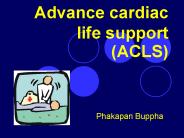Postresuscitation PowerPoint PPT Presentations
All Time
Recommended
40% of victims are initially resuscitated, but fewer than an average of 5% leave ... metabolic derangement leading to catabolism(3~7day) Stage II: 10~24 hr ...
| PowerPoint PPT presentation | free to view
2005 American Heart Association Guidelines for Cardiopulmonary Resuscitation and ... Arterial minus end-tidal CO2 as a prognostic factor of hospital survival in ...
| PowerPoint PPT presentation | free to view
Advance cardiac life support (ACLS) Phakapan Buppha Magnesium Dose 1-2 g IV for torsades de pointes Push typically over 5-20 minutes Asystole Postresuscitation ...
| PowerPoint PPT presentation | free to view
oxygenation can in most cases be obtained by room air - more ... Develop RDS due to immature lungs. Intracranial hemorrhage due to a fragile germinal matrix ...
| PowerPoint PPT presentation | free to view
... % Radiology CT or MRI Spinal Trauma Uncommon in young children Increased flexibility in young SCIWORA possible Clinical Radiography ... urinary tract injuries ...
| PowerPoint PPT presentation | free to download
ACLS 2005 What is new and why? Morbidity Rounds Feb 15, 2006 Rob Hall MD, FRCPC Overview Goal = review major changes to CPR, ALS, electrical therapies, cardiac arrest ...
| PowerPoint PPT presentation | free to view
... with liver failure may be performed for as long as 5 days ... not typically measured in the field, so there is potential for accidental overcooling ...
| PowerPoint PPT presentation | free to view
The Hypothermia After Cardiac Arrest Study Group Cooled patients to a target of 33 C for 24 hours after cardiac arrest and ROSC using cooling blankets. Ice ...
| PowerPoint PPT presentation | free to download
Induced Hypothermia How EMS can improve the long term outcomes for resuscitated patients Wake EMS Induced Hypothermia Team J. Brent Myers, MD, MPH Medical Director ...
| PowerPoint PPT presentation | free to download
and Update on New ACLS Guidelines Krista Piekos, Pharm.D. Clinical Pharmacy Specialist - Critical Care Harper University Hospital Adjunct Assistant Professor
| PowerPoint PPT presentation | free to download
... or central venous/pulmonary arterial line monitoring ... Do not delay transport to cool Can be ... vs thrombolytics = 15 6 Non-VF ...
| PowerPoint PPT presentation | free to view
For Healthcare Providers, 'Child' BLS Guidelines Apply to Onset of Puberty ... victims from about 1 year of age to the onset of adolescence or puberty (about ...
| PowerPoint PPT presentation | free to view
E: Exposure / Environmental control: Undress the patient & prevent hypothermia. PRIMARY SURVEY ... Undress patient completely. Protect from hypothermia. Pitfall: ...
| PowerPoint PPT presentation | free to view
Apply the primary and secondary evaluation surveys to assessment of the multiply ... Midfacial fracture == R/O cribriform plate fracture. Pitfalls: ...
| PowerPoint PPT presentation | free to view
Techniques of Cardiopulmanory Resucitation (CPR) Dr. Zhao Gang ( ) The Emergency Department, the 6th peoples hospital of Shanghai, Shanghai ...
| PowerPoint PPT presentation | free to view
Head Trauma Dr: Zohair AlAseri FRCPc, Emergency Medicine FRCPc, Critical Care Medicine FCEM UK Chairman, Department of Emergency Medicine King khalid University ...
| PowerPoint PPT presentation | free to download
Multiple Organ Failure after CPR Gau-Jun Tang, MD, MHS The relationship of lactate to shock, SIRS and MODS Lung ...
| PowerPoint PPT presentation | free to view
Hyperacute rejection is caused by A. Preformed antibodies B. B-cell generated antidonor antibodies C. T-cell mediated allorejection D. Nonimmune mechanism
| PowerPoint PPT presentation | free to view
TRAUMA-ICU NURSING EDUCATIONAL SERIES Acute Renal Failure: The Response to Severe Injury and Hypovolemic Shock Bradley J. Phillips, M.D. Critical Care Medicine
| PowerPoint PPT presentation | free to view
Any classification scheme will tend to be arbitrary and not accepted by all ... Light-sensitive; therefore, wrap IV bag in aluminum foal ...
| PowerPoint PPT presentation | free to view
CPR continues. Assess rhythm. Attempt defibrillation (up to 3 shocks if VF persists) ... failure and the mortality rates associated with the different classes ...
| PowerPoint PPT presentation | free to view
Current Concepts in Cardiopulmonary Resuscitation. R3 ? ? ? ... Can be reduced by giving slowly rather than by rapid intravenous bolus ...
| PowerPoint PPT presentation | free to view























